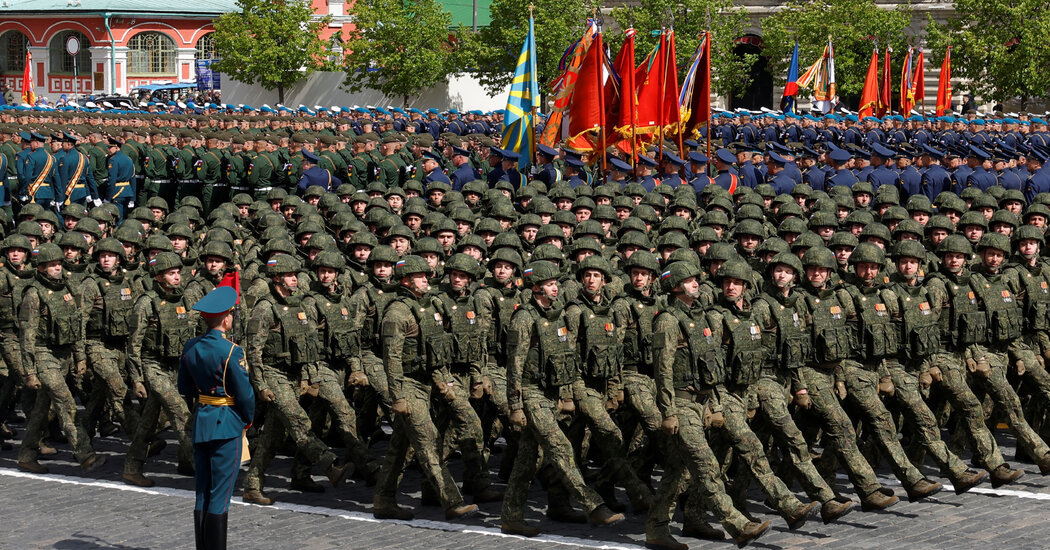Since the beginning of the war in Ukraine, groups linked to the Chinese government have repeatedly hacked Russian companies and government agencies in an apparent search for military secrets, according to cyberanalysts.
The intrusions started accelerating in May 2022, just months after Moscow’s full-scale invasion. And they have continued steadily, with Chinese groups worming into Russian systems even as President Vladimir V. Putin of Russia and President Xi Jinping of China publicly professed a momentous era of collaboration and friendship.
The hacking campaign shows that, despite this partnership and years of promises not to hack each other, China sees Russia as a vulnerable target. In 2023, one group, known as Sanyo, impersonated the email addresses of a major Russian engineering firm in the hunt for information on nuclear submarines, according to TeamT5, a Taiwan-based cybersecurity research firm that discovered the attack last year and linked it to the Chinese government.
China is far wealthier than Russia and has plenty of homegrown scientific and military expertise, but Chinese military experts often lament that Chinese troops lack battlefield experience. Experts say that China sees the war in Ukraine as a chance to collect information about modern warfare tactics, Western weaponry and what works against them.
“China likely seeks to gather intelligence on Russia’s activities, including on its military operation in Ukraine, defense developments and other geopolitical maneuvers,” said Che Chang, a researcher with TeamT5.
It is unclear how successful these attempts have been, partly because Russian officials have never publicly acknowledged these intrusions. But a classified counterintelligence document from Russia’s domestic security agency, known as the F.S.B., makes clear that intelligence officials are concerned. The document, obtained by The New York Times, says that China is seeking Russian defense expertise and technology and is trying to learn from Russia’s military experience in Ukraine. The document refers to China as an “enemy.”
With Mr. Putin largely cut off from the West, his country has come to rely on China to buy its oil and sell it technology that is essential to its war effort. Moscow and Beijing have formed a bloc against Washington and its allies, alarming Western leaders. The F.S.B. document presents a more complicated relationship than the “no-limits” partnership that Mr. Xi and Mr. Putin describe.
Allies have been known to spy on one another, but the extent of China’s hacking activities against Russia suggests both a higher level of mutual distrust and a reluctance by the Kremlin to share all that it is learning on the battlefield in Ukraine.
Drone warfare and software are of particular interest to China, the document says.
“The war in Ukraine fundamentally shifted intelligence priorities for both countries,” said Itay Cohen, a senior researcher with the cybersecurity firm Palo Alto Networks who has followed Chinese hacking groups for years. Experts say, and the document indicates, that China wants to learn from Russia’s war experience to bolster its own preparedness for potential future conflicts. Taiwan, in particular, is a major potential flashpoint with the West.
One Chinese government-funded group has targeted Rostec, the powerful Russian state-owned defense conglomerate, seeking information on satellite communications, radar and electronic warfare, according to Palo Alto Networks. Others have used malicious files, intended to exploit vulnerabilities in Microsoft Word, to penetrate Russian aviation industry targets and state bodies.
Messages seeking comment were left with the Kremlin and the Chinese Embassy in Moscow.
Not all Chinese hacking groups operate at the behest of the government. But security experts have seen evidence of government ties.
The Russian cybersecurity firm Positive Technologies, for example, said in 2023 that cyberattacks had been mounted on several Russian targets, including in the aerospace, private security and defense sectors. The attackers used a tool known as Deed RAT, which is widely deployed by Chinese state-sponsored hackers. Cybersecurity experts say Deed RAT is considered “proprietary” among these groups, and is not available for purchase on the dark web like other malware tools.
That has enabled state-backed hacking groups in China to use it more widely because it is tough for their adversaries to find a way to combat the malware.
Chinese state-sponsored hacking groups have often targeted international companies and government institutions, including in the United States and Europe. But hacking groups appear to have become more interested in Russian targets after the country’s February 2022 invasion of Ukraine.
Mr. Chang said he and his colleagues tracked several Chinese hacking groups targeting Russia. Among them was one of the country’s most active hacking groups, known as Mustang Panda.
Little is known about Mustang Panda’s origins or where it operates inside China, according to researchers who have studied the group. Its activities often accompanied China’s Belt and Road economic development initiative, according to Rafe Pilling, director of threat intelligence at the security firm Sophos. As China invested in development projects in West Africa and Southeast Asia, he said, hacking soon followed.
That is most likely because China invests in countries where it has political and economic interests, which motivates state-sponsored hackers, Mr. Pilling said.
After Russia invaded Ukraine, TeamT5 said that Mustang Panda expanded its scope to target governmental organizations in Russia and the European Union.
Mr. Pilling, who has been monitoring Mustang Panda’s activities for several years, says he suspects that the group is backed by China’s Ministry of State Security, its main intelligence body. The ministry supports threat groups that attack targets across the world, he said. In 2022, Mustang Panda targeted Russian military officials and border guard units near the Siberian border with China.
“The targeting we’ve observed tends to be political and military intelligence gathering,” Mr. Pilling said. That is true of all Chinese hacking groups targeting Russia, he said. “I think of them as being one of the main tools that the Chinese state has for gathering political and economic intelligence.”
Mustang Panda has also attracted the attention of the American authorities. In January, the Justice Department and the F.BI. said that Mustang Panda’s malware had infected thousands of computer systems, seeking to steal information. Many of the targets were American, but the malware was also found on computers belonging to Chinese dissidents and European and Asian governments, according to a federal indictment.
The indictment makes clear that the United States believes that Mustang Panda is a state-sponsored group.
Other Chinese groups have targeted Russia, too. Mr. Chang said his team was following another threat group, Slime19, that is continuously targeting the Russian government, energy and defense sectors.
In agreements in 2009 and 2015, China and Russia promised not to carry out cyberattacks targeting each other. But even at the time, analysts suggested that the announcement was largely symbolic.
Chinese hacking in Russia did not begin with the war in Ukraine. A 2021 cyberattack, for example, targeted Russian submarine designers. But experts say the war prompted a spike in computer intrusions.
“The activity — we saw it immediately in the months following Russia’s full-scale invasion of Ukraine,” Mr. Cohen said. “Even though the public narrative was of close ties between Russia and China.”
Megha Rajagopalan is an international investigative reporter based in London.
The post China Unleashes Hackers Against Its Friend Russia, Seeking War Secrets appeared first on New York Times.




